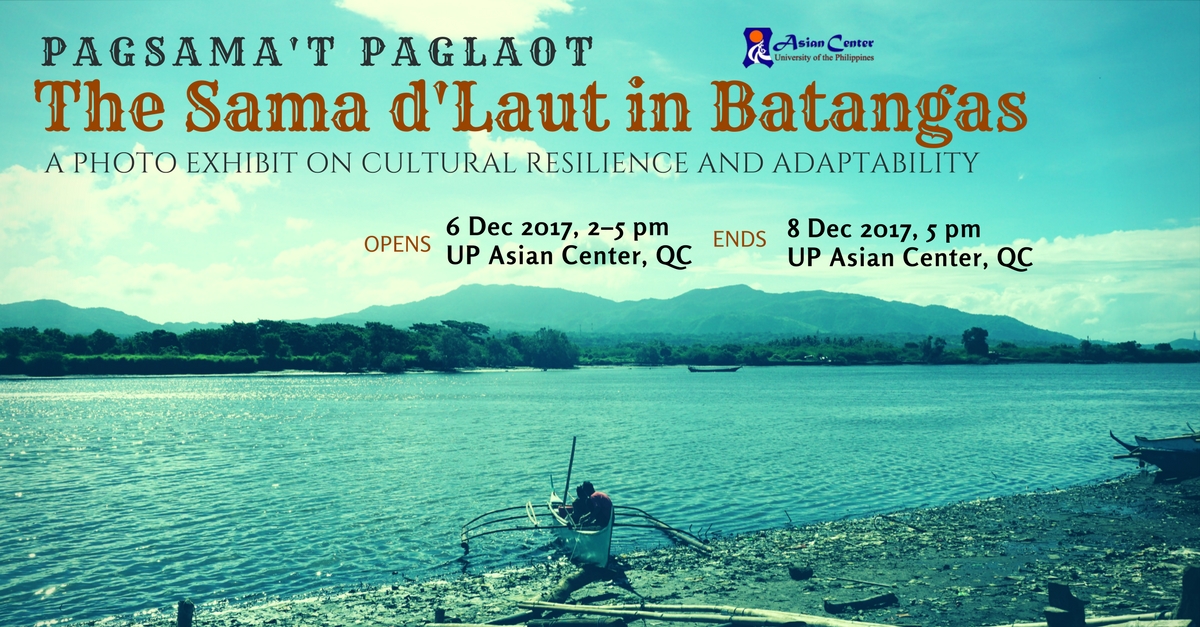
Graduate students taking up Philippine Studies (PS) 201 class under Dr. Henelito Sevilla, Jr., will launch a photo exhibit, Pagsama’t Paglaot: The Sama d’Laut in Batangas on 6 December 2017, 2:00 pm to 5:00 pm at the UP Asian Center, Quezon City.
The exhibit, which depicts the lives and experiences of the Sama d’Laut community in Wawa, Batangas City, will be open until 5 p.m., 8 December 2017. The exhibit is free and open to the public
ABOUT THE PHOTO EXHIBIT: FEATURED TOPICS
A community of around 200 Bajau families, known for their sea-based way of life, has now settled in Wawa, Batangas City, Batangas. Originally from Basilan, they had to move out because of armed conflict in the 1970s. On 25 November 2017, graduate students taking up Philippine Studies (PS) 201 under Dr. Henelito Sevilla visited this community in order to:
1. Examine the economic, socio-cultural and political dimensions of the Sama d’Laut community;
2. Inquire how their displacement to areas far from their traditional homeland (or rather, homesea) changed their way of life and culture;
3. Analyze the possible influence of internal and external interactions with the community’s economic, socio-cultural and political institutions;
4. Help the community understand their connection to the larger Philippine society and the Asia-Pacific region;
5. Share and encourage the appreciation of the Sama d’Laut’s indigenous knowledge and culture to the wider public.
Highlighting the community’s cultural resilience, on the one hand, and their ability to adapt to their present environment, on the other, the photo exhibit addresses the five foregoing themes around the following topics:
- Historical Background
- The Sama Community in Malitam, Batangas
- Preservation of Dance, Rituals, and Housing
- Change and Adaptation: Daily Life
- Immersion Experiences
The students brought books and school supplies, among others. And they will be around on 6 December during the exhibit opening to share their experiences in the field and engage questions from the audience. They are taking Philippine Studies 201, an introductory graduate course which entails a “systematic analysis of the Philippines as a complex society within the context of developments in the Asia Pacific region.”
ABOUT THE SAMA D’LAUT COMMUNITY
Commonly known as the Bajau or “sea gypsies”, the Sama d’Laut are among the numerous ethnic groups of Maritime Southeast Asia. But decades of conflict amidst a rapidly globalizing world suffering from colossal environmental disaster have forced some to drop their seaborne lifestyle. Forcefully displaced, some of the Sama d’Laut now live in urban or other coastal areas where they have to face the challenge of integration within land-locked communities.
VENUE And VICINITY MAP
Vehicles entering the UP Asian Center (GT-Toyota Asian Cultural Center) grounds can only do so via the gate on Magsaysay Avenue that is near a UP guardhouse, a few meters away from Katipunan Avenue, and across Maynilad. A small gate for pedestrians on Guerrero St. lies across the College of Law parking lot and a few meters away from a waiting shed, where the Ikot jeepney, and jeepneys from Philcoa and SM North pass by. VIEW VICINITY MAP and GOOGLE STREET VIEW
INQUIRIES And ATTENDANCE
If you are planning to come with/as a big group (a class or delegation), please inform us the number of participants at This email address is being protected from spambots. You need JavaScript enabled to view it.. It would also be best if their names could be registered online or if you could send us a list of their names.
OTHER UPCOMING EVENTS @ THE UP ASIAN CENTER
- ‘DiasFora:’ Perennial Issues And New Dimensions Of Filipino Migration | A Forum-Exhibit, 4 Dec 2017
- The Rohingya Conundrum: Its Significance for International Studies | A Public Lecture, 5 Dec 2017
- Unpacking Asia: Emerging Issues In Politics, Security, And Foreign Policy | A Forum-Exhibit, 7 Dec 2017
The UP Asian Center offers M.A. degrees in Asian Studies with four fields of specialization: Northeast Asia, Southeast Asia, South Asia, and West Asia. The Center also has an M.A. program in Philippine Studies that allows students to major in Philippine society and culture, Philippine foreign relations, or Philippine development studies. The Center offers a Ph.D. program in Philippine Studies in conjunction with the College of Arts and Letters and the College of Social Sciences and Philosophy. Get an overview of these programs. The Asian Center also houses a peer-reviewed, open-access journal, Asian Studies: Journal of Critical Perspectives on Asia. It has published several books and monographs, and hosts or organizes various lectures and conferences.

